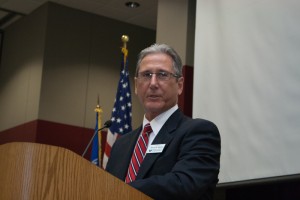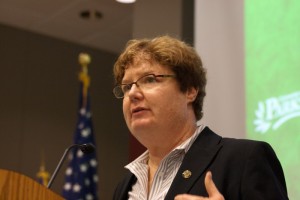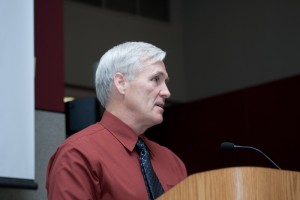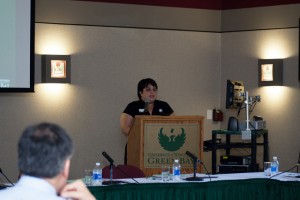GREEN BAY – The University of Wisconsin-Green Bay has “deep roots and strong wings,” said Chancellor Thomas Harden, in welcoming the Board of Regents on campus Thursday.
Those deep roots provide a “sense of belonging that can’t be disrupted, allow an individual to stand even during adversity, makes a secure environment for growth and learning, and allow a person to know their convictions and hold them tightly,” Harden said. “Strong wings are to develop independence and autonomy, to learn to try out new ways of thinking, to extend boundaries, to have the strength and confidence to ask the best questions, and to think for themselves.”
Harden said “deep roots and strong wings” goes beyond what the university provides to students, but also defines the university itself. “We’re proud of the origins of our university, the growth we’ve experienced, and the potential that we still have,” Harden said.
Since its establishment in 1965, the UW-Green Bay has remained committed to its founding principles of an interdisciplinary approach to learning and sustainability, Harden said. The payoff comes in well-prepared graduates who are “job ready” and attractive to employers, he said, as reflected in a 94% job placement rate for graduates last year.
A short video presentation highlighted the mutual benefits to faculty, staff, and students of the interdisciplinary, problem-solving approach espoused throughout UW-Green Bay’s curriculum. It’s a model that puts UW-Green Bay ahead of the curve, one faculty member noted, as more institutions of higher learning embrace similar approaches.
Harden told Regents that UW-Green Bay is continuing to grow, citing a successful $30-million capital campaign, the rapid growth of an adult degree program, the increase in online learning opportunities, the university’s partnerships with other area institutions, and progress with minority enrollments. He also reminded Regents of the women’s basketball team’s advancement to the Sweet 16 round of the playoffs last year.
Looking ahead, Harden said that UW-Green Bay’s priorities include expanding its graduate studies opportunities, invigorating the Weidner Center for the Performing Arts, increasing the branding and marketing of the university, remodeling the 40-year-old Cofrin Library, and addressing faculty and staff compensation.
UW System continues to enhance student transfer policies
As part of its continuing work to better serve transfer students, the UW System is pilot testing an enhancement to its online Transfer Information System (TIS)—one that allows transfer students to see how their course work at one college will transfer and apply toward a specific major at another institution.
The new Transfer Plan enhancement started in 2010-11 with UW-Madison as the first institution to provide Transfer Plans to students transferring from all other UW institutions. By December 2011, students transferring from Wisconsin Technical College System institutions also will be able to receive a Transfer Plan for UW-Madison degree programs. By 2015-16, the same capabilities will be extended to all UW institutions.
Student Regent Katie Pointer, who checked out TIS to facilitate her own transfer this year from UW-La Crosse to UW-Madison, called it “a phenomenal tool.”
The UW System’s attention to transfer policies reflects the recognition that transfers are an increasingly standard part of the university experience. One-third of UW System’s bachelor’s degree-recipients are transfer students, Senior Vice President for Academic Affairs Mark Nook told the Board. Ensuring their success is therefore an important part of the System’s More Graduates initiative to grow the number of college degree-holders in the state,
During the 2009-10 academic year, more than 17,000 students successfully transferred credits from another postsecondary institution into or within the UW System. This was the largest number of transfer students since the UW System was created in the early 1970s.
“Successful transfers – from one UW campus to another, and between other institutions and the UW institutions – are one important indicator of access,” UW System President Kevin P. Reilly said.
In 2009-10, 38% of transfer students transferred between UW institutions, 30% from out-of-state institutions, 23% from the Wisconsin Technical College System, 7% from Wisconsin private institutions, and 2% from international institutions.
Among UW institutions, UW-Milwaukee received the most new transfer students (2,424), followed by UW-Madison (1,671), UW-Oshkosh (1,436) and the UW Colleges (1,429).
Regents were told that UW institutions are also implementing other initiatives to identify transfer students and serve them better.
UW-Oshkosh, for example, revised its Honors Program and added a track for transfer students after realizing that the requirements for admission to the Honors Program made it very difficult for transfer students to participate. “We know from research that participation in these types of learning experiences assist students to remain in college and to graduate. We did not want our transfer students to miss out on these opportunities,” said Carleen Vande Zande, UW-Oshkosh’s Assistant Vice Chancellor for Curricular Affairs and Student Academic Achievement. Between 35 to 45% of UW-Oshkosh’s graduating class are transfer students, she added.
Vande Zande told the Board that the UW-Oshkosh’s data indicates that transfer student orientation needs are distinct from other students, and maintaining advising relationships with advisors across institutions is vital.
Carla Rabe, Assistant Dean for Student Services at UW-Fox Valley, where 44% of students transfer to another UW institution, reported on the impact of UW-Oshkosh having an advisor on-site at UW-Fox Valley and UW-Fond du Lac. “The overarching goal of the collaborative effort is to provide top-notch advising to our students, while creating a smooth transfer process with an end result of seeing students complete their educational plans successfully,” Rabe said.
Regent Judy Crain commended the presentation, noting that transfer issues are “so important to so many students.”
Student Regent Troy Sherven, citing his own experience in going back to university after two decades in the workforce, questioned what assistance is available for non-traditional transfer students. Nook reported that there are ongoing efforts to assess credit-for-prior-learning options. “It’s a growing issue,” Nook said.
Regent Vice President Brent Smith commented that the presentation underscored that it is “perception, not reality, that not a lot is going on with transfers” in the UW System. He suggested that more should be done to communicate externally what is being done effectively.
Reilly noted that current federal standards for collecting data on retention and graduation rates, by not including transfer student data, “have not caught up to students.”
Education Committee
Report of the Senior Vice President
Interim Senior Vice President Mark Nook reported to the Education Committee on possible changes involving the UW System Office of Academic Affairs — and Systemwide policies and procedures affecting every campus — that are likely to emerge from the President’s Response to the Advisory Committee on the Roles of UW System Administration.
In his response to the Advisory Committee, President Reilly had suggested specific changes to the role played by UW System Administration, redirecting its focus toward maintaining the proper array of degree options across the state, and away from assessing academic quality, which would be left to UW institutions and their accrediting bodies.
Nook reaffirmed that the Regents they would still consider and approve new programs on a case-by-case basis and continue to evaluate proposals in relation to duplication or gaps, if any, in the Systemwide array. He told the committee he expects the new review process to be in place effective fall 2012.
“This is a watershed time,” Nook said regarding the package of proposed changes. “In the next 18 months or so we will be putting in place policies and procedures that will guide how we do things over perhaps the next two decades.”
Nook shared an update on streamlining and consolidation of grants administered by the Office of Academic Affairs. At present, about $2.6 million is awarded annually through 11 different funds which solicit proposals from the campuses. Nook said the plan is to reduce the number of funds to three. The longstanding Applied Research Grants program (about $600,000 annually) is likely to remain unchanged. The two new, consolidated funds would be an “Institutional Change Grant” program to fund major projects having the potential to advance the System’s Growth Agenda goals, and a smaller fund for “Conferences, Institutes and Workshops” that would support selected professional development efforts and activities that address issues of the day.
Nook talked also of elements of the plan that would de-centralize UW System task forces and working groups. Possible examples include statewide consortia involving women’s issues or urban affairs. He said UW System institutions will be invited to submit RFPs if they are interested in housing a statewide center.
UW-Parkside discussion of its campus academic plan
Terry Brown, UW-Parkside Provost, offered an overview of her institution’s campus academic plan to the Education Committee.
UW-Parkside, founded in 1968, currently serves 5,160 students, primarily coming from the surrounding counties of Kenosha, Racine, and Walworth.
With students of color comprising 25% of its Fall 2010 enrollment, UW-Parkside is the most diverse campus in the System. Brown acknowledged that there are ongoing challenges in ensuring that the diversity of the graduating class reflects that of the incoming class. She noted that UW-Parkside’s first-to-second-year retention rate (66%) and its six-year graduation rate (32%) are low, and research identifies two primary factors: college readiness and financial stress.
“We find that many of our students need to ‘stop out,’ to work full-time, so they can afford to continue their studies,” Brown said. “That six-year metric doesn’t work well for us.”
She described several initiatives under way to address student success.
One, a strategic intervention or “early alert” system, encourages faculty members to take action at the first signs a student is beginning to struggle. Many programs exist at Parkside, but Brown acknowledged that until recently those programs weren’t always well coordinated. The University is also taking a comprehensive approach to evaluating possible barriers—academic calendar, academic probation policies, even drop-add deadlines—and improving the student success rate.
Brown also shared a progress report on development of a new teacher preparation program. Phase II of a Teacher Preparation initiative is underway, focusing on developing pathways to licensure based on the needs of the student and the region. The university’s goal is to begin roll-out of these pathways in fall 2013. She said community support of the effort is strong, adding, “This is truly a community partnership.”
In Spring 2013, UW-Parkside will have its fifth regional accreditation by the Higher Learning Commission of the North Central Association. The university has launched the self-study process in preparation for the Spring 2013 site visit.
UW-Green Bay presents on Cofrin Center for Biodiversity
In a presentation before the Education Committee, UW-Green Bay Prof. Robert Howe, Director of the Cofrin Center for Biodiversity, described how his program fulfills elements of the University’s mission involving environmental education and hands-on student learning.
The Biodiversity Center focuses on native plants and animals of the western Great Lakes region. The center incorporates the arboretum, off-campus natural areas in Door, Brown and Manitowoc counties, a herbarium, the Richter Museum of Natural History, the University greenhouse, the archives of the Wisconsin Society for Ornithology, and online taxonomic guides, lists and archives.
He said that, on the Arboretum alone, students this semester are pursuing research on salamander habitat, pheromones in ant colonies, forest dynamics, and birds and fruit distribution.
“And we don’t have to take a van to any of these places,” Howe said. “We just walk out the door to the Arboretum.”
In other business, the Education Committee:
- Approved a UW-Madison School of Medicine and Public Health appointment of Dr. Phillip Farrell to the Oversight and Advisory Committee of the Wisconsin Partnership Fund;
- Approved revisions to Faculty Personnel Rules at UW-Milwaukee.
Business, Finance, and Audit Committee and Capital Planning and Budget Committee
In a joint session before the Business, Finance, and Audit Committee and the Capital Planning and Budget Committee, UW-Green Bay Library Director Paula Ganyard led the presentation, “A 21st-Century Library for 21st-Century Learning.”
- See the UW-Green Bay PowerPoint, “ “
The actual and figurative center of the UW-Green Bay campus is an aging space that is long overdue for a technological and aesthetic upgrade, Ganyard said.
UW-Green Bay is proposing a $35.4-million upgrade that would bring the 8-story, 187,000-square foot David A. Cofrin Library into the 21st century, offering a variety of benefits for modern learners and the faculty who teach them. It’s an overdue overhaul that will help prepare the leaders of tomorrow, Ganyard said.
“In 2012, we’ll be celebrating our 40th anniversary; and in that time, we’ve received no major updates,” Ganyard told committee members. “It is a library that was built for yesterday’s students, being used by the students of today.”
Among the areas targeted in the proposed top-to-bottom renovation are learning and classroom spaces—which officials say should be multi-purpose, flexible and collaborative—as well as technological connectivity, aesthetic appearance and environmental design. Ganyard cited UW-Milwaukee’s Golda Meir Library and its Daniel M. Soref Learning Commons as a recent example of success.
UW-Green Bay Prof. Andrew Kersten emphasized the importance of the library to his teaching and that of his colleagues. The time has come, he said, to bring the building up to date.
“The plan … is an opportunity to recapture the founding spirit of UW-Green Bay,” Kersten said. “And as a state, as we rededicate ourselves to higher education, I think it’s very appropriate that we rededicate ourselves to this library.”
UW-Platteville and UW-River Falls provide Master Plan updates
UW-Platteville Provost Mittie Nimocks told Regents in a joint session that UW-Platteville, with a 4% annual growth rate, is the fastest growing campus in the UW System. Enrollment is projected to top 10,000 students by 2025. That rapid growth presents both challenges and opportunities in developing a master plan, Nimocks said.
- See the
Nimocks emphasized that UW-Platteville’s master planning is rooted in its academic vision. Priorities include increasing retention and graduation rates for all students and eliminating the achievement gap, she said. Other priorities also include increasing student engagement, growing diversity, strengthening academic planning, and making stronger connections between faculty and external partners.
UW-Platteville’s core programs continue to grow, Nimocks said. The number of engineering majors increased by 49% in the past decade, criminal justice by 145%, biology by 113%, and business majors by 52%. Distance learning enrollment has increased by 1,300%.
Assistant Chancellor Ronald Cramer said UW-Platteville’s master plan aims to provide more quality undergraduate research space and additional residence halls to accommodate interest in more on-campus housing.
Also presenting before the joint session, UW-River Falls Chancellor Dean Van Galen introduced the university’s Master Plan update, noting that UW-River Falls is “a beautiful campus, but there are many things we need to do.”
UW-River Falls Campus Planner Dale Braun reported that student enrollment has grown significantly, and is expected to exceed 9,000 students by 2025. Larger student bodies bring more demand for on-campus living space, more open space, and more vehicle parking, Braun said. The primary academic space need at this time is a building to house a science initiative for the pure and applied sciences.
- See the
Braun said the campus is also collaborating with the city of River Falls on a major reconstruction plan for Cascade Avenue, a prominent corridor for both the city and campus. The project also creates more defined campus entry points, he said.
In keeping with its sustainability goals, Braun said the master plan reuses and repurposes many existing structures. Rodli Hall, for example, is repurposed from a dining commons to a student services office cluster.
Business, Finance, and Audit Committee
Report of the Senior Vice President
Michael Morgan, Senior Vice President for Administration and Fiscal Affairs, reported to the Business, Finance & Audit Committee on changes under way in response to the recommendations of the President’s Advisory Committee on the Roles of System Administration. Those changes include new directions for the Office of Operations Review and Audit, delegation of human resources responsibilities, and implementing the flexibilities gained in the 2011-13 biennial budget.
Morgan highlighted the progress in implementing several of the new flexibilities. He told committee members that plans for implementing the ITMAC business model (interpret, train, monitor, advocate and consult) are being developed.
Morgan told Regents that President Reilly has convened a task forced to be co-chaired by UW-Platteville Chancellor Dennis Shields and UW-Oshkosh Chancellor Rick Wells that will guide the process of developing new personnel systems, one for UW-Madison and another for the rest of UW System, as mandated by state budget.
Noting that as part of the new flexibilities, the 2011-13 biennial budget required the Regents to fund UW institutions through a block grant, Morgan told the committee that UW System had immediately called together a group of Budget Officers, Controllers, and others to make recommendations to the Chief Business Officers regarding its implementation.
“We’re fairly close now to understanding what this new block grant budget will look like,” Morgan said. “It’s a complicated set of questions being considered by these groups.”
He noted that Chancellors are now represented in the President Reilly’s weekly cabinet meetings and involved in briefings with Board leadership. “I think it’s consistent with the direction that the Advisory Committee wanted us to proceed,” Morgan said.
Under the new flexibilities, UW capital projects involving a cost of less than $500,000 and funded entirely from gifts and/or grants are exempted from Building Commission approval and Division of State Facilities management. Following up on the Board’s approval in September of a process for obtaining bids on UW projects of this magnitude, Morgan reported that the Building Commission had discussed the proposal at its September meeting and approval is anticipated later this month.
Morgan told Regents that further updates on the implementation of flexibilities will be provided on a regular basis in the future.
Morgan also updated Regents on the status of the Human Resource System implementation and on-going efforts to work through early implementation challenges. The project remains on budget and the goal is to have the system stable by the end of the fiscal year, Morgan said.
In other business, the Business, Finance & Audit Committee:
- Formally adopted the Operation Review and Audit Charter, as presented by Elizabeth Dionne, Director of the UW System Office of Operations Review and Audit;
- Heard a presentation by Dionne on highlights of the recently completed program review of the Higher Education Location Program (HELP). The review concluded that HELP is effective in meeting its program objectives and is generally perceived as a valuable program by external users and UW institution staff;
- Heard an update of on-going projects the Office is working on along with information regarding current and/or pending activities of the Legislative Audit Bureau which may impact the UW System. In addition to the completed review of HELP, current projects include Review of Family Educational Rights and Privacy Act (FERPA) Implementation; NCAA Division III Athletics – La Crosse; NCAA Division III Athletics – Eau Claire; Policies Affecting Students with Disabilities; Undergraduate Academic and Career Advising; and Privacy Controls Related to Personally Identifiable Information;
- Accepted six bequests with a total value of $1,125,288;
- Heard a report from Debbie Durcan, Vice President for Finance, regarding gift, grant, and contract awards for the fiscal year July 1, 2010 through June 30, 2011. Total awards for the period were $1,484,615,867, a decrease of $34,875,578 compared to the prior year;
- Heard a report by UW System Trust Funds Director Doug Hoerr on current asset allocation within the long-term and intermediate funds. He also discussed current spending plan policy and its impact on the funds; and
- Heard a report on 2011 Proxy Voting Season Results. The 2011 proxy season saw the filing of 348 proposals related to social issues, with nearly half of them coming to votes. Through the end of June, 164 social issue proposals resulted in shareholder votes, 120 were withdrawn, 53 were allowed to be omitted by the Securities Exchange Commission, and 11 are still pending;
Capital Planning and Budget Committee
Associate Vice President David Miller reported that the Building Commission approved about $33M for projects at its September meeting. The funding for those projects is approximately $8M General Fund Supported Borrowing, $25M Program Revenue Supported Borrowing and $1M Gift/Grant funds.
In other business, the Capital Planning & Budget Committee:
- Approved UW-Madison’s request for authority to construct the $52.8M School of Nursing project, which includes an increase of the project scope and budget, and approval to seek a waiver to allow single prime bidding for the project. The project’s funding includes about $17.7M Gift and Grant funds;
- Approved UW-Madison’s request for authority to construct the first phase of the Student Athlete Performance Center Project, which was formerly known as the Badger Performance Center project;
- Approved UW-Madison’s request for authority to lease space for the School of Medicine and Public Health, Department of Family Medicine;
- Approved UW-Milwaukee’s request for authority to increase the project scope and budget and construct the School of Freshwater Sciences Project and authority to seek a waiver to allow single prime bidding for that project;
- Approved UW-Milwaukee’s request for authority to seek the release of additional funds to continue planning the Kenwood Interdisciplinary Research Complex (IRC)-Phase I Project;
- Approved UW-Platteville’s request for authority to modify its campus boundary;
- Heard a report from UW-Platteville on a proposal from UW-Platteville and the UW-Platteville Real Estate Foundation to develop a private residence hall on the UW-Platteville campus to house approximately 400 students and a dining facility;
- Approved UW-River Falls’ request for authority to modify its campus boundary to agree with various changes associated with the new UW-River Falls Master Plan;
- Approved UW-River Falls’ request for authority to reimburse the city of River Falls for Cascade Avenue assessable improvements; and
- Approved the UW System staff’s request for authority to seek Building Trust Funds for the preparation of pre-design and preliminary design documents for facility renewal projects pursued under the categorical enumeration of the Facility Renewal Program for the UW-Stout Harvey Hall Renovation Phase II project, and UW-Oshkosh’s Clow Social Science Center and Nursing/Education Building Renovation project.
Photos by Kimberly Vlies, UW-Green Bay Office of Marketing and University Communication
###
The UW System Board of Regents will resume its October 2011 meeting at 9 a.m. on Friday, October 7,
at UW-Green Bay
Related: October 7 (day 2) news summary




